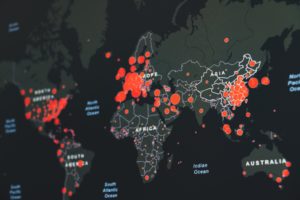On February 14, the Czech government instituted a new state of emergency that will be in place for two weeks, that is until the end of February. This happened the same day the previous state of emergency expired after the proposal for its extension was rejected by the Chamber of Deputies on Thursday, February 11. The new state of emergency was introduced after a long debate with regional governors, who eventually asked for a new state of emergency to be put into effect.
Category: Laws
Anything related to laws, legal regulations, legal matters, etc.
Coronavirus in Czechia: State of Emergency to Expire on February 14
The Chamber of Deputies rejected the proposal for another extension of the state of emergency, which means that the state of emergency will expire on February 14. According to opposition parties, the government has failed to establish any sensible solutions to stop the pandemic, including a law on the basis of which the measures would be introduced without the state of emergency. Now the government has to decide how to proceed after the state of emergency ends.
Coronavirus in Czechia: New Category on the Coronavirus Travel Map
The Czech coronavirus travel map, also known as Coronavirus Traffic Light System, will see some major changes as of Friday, February 5. The most noticeable of these changes is a completely new category of countries being added. This was announced on Monday, February 1, only a few days after conditions for travelling into the country were tightened due to the more contagious British mutation of COVID-19.
Coronavirus in Czechia: Non-Essential Travels to Country Now Banned
All travels to the Czech Republic for non-essential purposes are now banned as decided by the government on Thursday, January 28. Without an essential purpose, foreigners won’t be, therefore, allowed to arrive in Czechia. This measure was announced on Friday and came into effect already on Saturday, January 30, 12:00 AM. It will remain in place until stated otherwise along with the other countermeasures which are now in effect.
When, How and Who Can Apply For a Permanent Residence Permit? All Your Questions Answered
Did you know that after 5 years of continuous stay in the Czech Republic, every foreigner can apply for a permanent residence card? By obtaining permanent residence, an individual gets almost the same rights and responsibilities as a citizen of the Czech Republic. Keep reading to find out more about the permanent residence card.
Czech Language Exams for Expats Will Be More Difficult
After six years of consideration, the Czech Ministry of Education has decided to make Czech language exams more difficult for expats interested in getting a permanent residence permit. This means that instead of passing a level A1 language exam expats will have to prove their knowledge of the Czech language at level A2.
Mandatory Integration Courses for Expats Have Started
The Czech Ministry of the Interior’s proposal for mandatory integration courses for expats living in the Czech Republic was finally approved after a few months-long silence. The courses started taking place on January 1 as originally planned and are mandatory for some non-EU expats who have received or will receive a residence permit in the Czech Republic after January 1, 2021.
Financial News in 2021: What Has Changed for Employees in the Czech Republic?
As every new year, the Ministry of Finance of the Czech Republic introduced some changes in regards to finance and taxes for the year 2021 that will impact the everyday lives of both citizens and foreign employees.
The Never Ending Story of Brexit; Permanent Residence Permit and Updates for UK ‘Latecomers’
With the coronavirus pandemic and the official withdrawal of the UK from the EU, traveling between countries has become more complicated. It is a real mind-blowing mix of rules and conditions. However, the main priority is to protect the right of those who moved abroad for work or study. Read the following article to find out the latest updates on this issue.
Coronavirus in Czechia: Restrictions in the New Year & Vaccination Update
During the Christmas holidays, the Czech Republic returned to level 5 of the so-called PES system. Since level 5 is the highest level, the strictest countermeasures possible system are currently in effect. These restrictions apply mostly to stores, some services, freedom of movement, or studying, for example. They should supposedly remain in place until January 10 but there is a chance their validity will be further extended.










